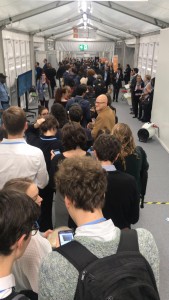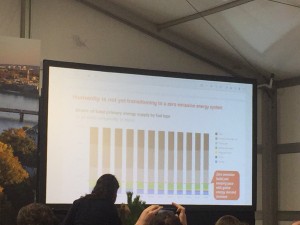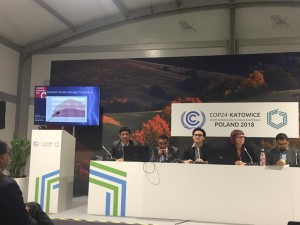COP24 has been a crazy experience. Diplomacy at work is sometimes undiplomatic. Below are some quotes that I heard/read at some events.
- “Now that we are done with the skit”, we can move on to our speakers for today. – Moderator Wells Griffith in a side event titled “US innovative technologies spur economic dynamism” on December 10 after protestors were escorted out.
The side event was heavily anticipated by COP24 attendees who had to line up to enter the event. The room was packed way before the event was supposed to start. There was a heavy security presence because an Action (a demand/protest) was organized for the side event. While waiting outside the room, I could hear “shame on you” and “keep them in the ground” being chanted inside. Those of us outside joined in. After the protestors were escorted out by security, the doors opened again, and I was able to enter the room to hear the panelists.
- Our goal is “to improve the resiliency, efficiency, and competitiveness of coal fire plants” …. “The question is: do we continue using old coal technology used in the 1970s or move forward with new technologies which will be near-zero emitting?” – Steve Winberg, assistant director at the US Department of Energy speaking at the same panel as above on December 10.
Winberg was clearly facing difficulty defending his position supporting coal industries. When someone from the audience asked him why the Department thinks it is necessary to reduce emissions from coal plants when Trump has been calling climate change a hoax, he went on to talk about how we are privileged because we don’t use wood and fire to cook like people do in many other countries, and that we are not appreciative of our privilege. It was completely unrelated. Since he’d been on the job for a year, he had worked to make the coal industry more efficient, and since nobody had told him to do otherwise, he would continue.
- “The sun does not shine 24 hours a day. Wind is not available 24 hours a day. But you can get enough LNG [Liquified Natural Gas] in a few minutes.” A spokesperson from Sempra Energy speaking at the same event as mentioned above on December 10.
There’s nothing more to say.
- “I’m warning all of our people here that if you let this go, then it signals that we are mitigation-centric. We need to signal that we are supporting more adaptation.” – Delegate of Saudi Arabia on including the 1.5 C Special Report on the guidelines for the Green Climate Fund (GCF) on December 11.
Saudi Arabia was being difficult in the meeting to draft the guidelines for GCF. He went on to say that the committee does not understand what they are doing by trying to include a mention of the 1.5 C Special Report in paragraph 7, so the Saudis have to enlighten them. They made the effort to block the mention of the IPCC report wherever they could.
- “…and together, we can proceed to be more resilient, along with the SDGs… I really don’t know what they are… to limiting global warming to 1.5 degrees.” – President of Maldives in his speech at a side event about “Loss and Damage and the SAMOA strategy for 2030” on December 12.
The Pavilion erupted with giggles when the president said this sentence. I wasn’t sure if he said it as a joke or whether he really did not know what SDGs (Sustainable Development Goals) are. He then went on the reference the “IPPC” report twice and also said “I’ve been told to read from a statement, but I really don’t want to do that. Anyway, I guess I have to return to it” in the middle of his speech. The next day, however, the President of Maldives called on all parties to support the IPCC 1.5 C Special Report on behalf of all small island states, so I suppose his statements the previous day were for giggles…
- “Yes, this is a manel, not a panel. We should consider that.” — Moderator of a panel on “New Adaptation approaches in the age of the SDGs” in the Japanese Pavilion on December 13.
In the Q&A, one participant raised the point that there were five men on a panel about local adaptation projects, when, in fact, women tend to be actively involved in the household, farming, or other work as breadwinners. This point is especially true in rural areas in developing countries since men often migrate to urban areas in search for better economic opportunities. One of the panelists explained that their adaptation projects address gender imbalances in rural areas and include women in implementing adaptation projects. It was unfortunate that there were no women in the panel, but it wasn’t the panelists who organized the event.
- “Our partners are smart. Partners. Not me. And not even you.” Adau from Timor Leste, leading the discussions on Loss and Damage (L&D) on behalf of the Least Developed Countries (LDCs), December 14.
It was a grim moment for the LDCs knowing that there’s no finance being discussed for L&D in the Katowice text currently being renegotiated at the time of writing. The developed countries are completely trying to scrap away L&D according to Adau, they kept pushing discussion on this issue until finance came up under Articles 9.5 and 9.7 last night, and they’re attempting to merge the issue under adaptation. But the reality is that L&D requires at least double the amount of money that has been allocated for adaptation so far. Adau left the room early to return to negotiating with other countries. A gentleman from Bangladesh mentioned that his country is attempting to pilot a 2-year loss and damage national mechanism, which was a ray of hope.


